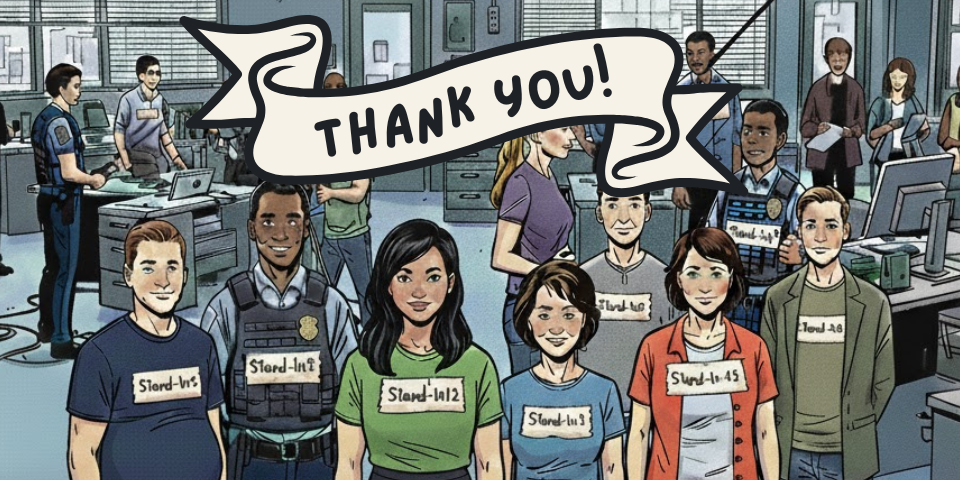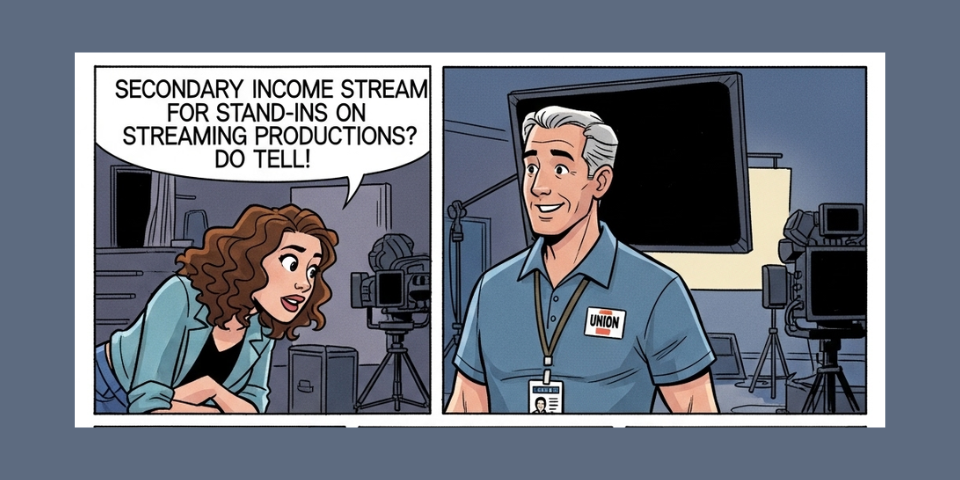At press time, the Proposed 2014 Network Television Code Contract recently negotiated between SAG-AFTRA and producers is up for vote. The contract does not cover stand-in work on film or on scripted dramatic television series. Instead, it governs, per an email from the union on August 4, 2014, stand-in work on “non-dramatic programs, daytime serials, variety, quiz, game, reality, talk, news, sports programs and promotional announcements.”
By January 9, 2015, at 5pm PST, votes must be received by SAG-AFTRA. A summary of the terms for the successor agreement to the Network Television Code is included on the SAG-AFTRA website, and may be read by clicking here. To vote online, click here.
As a stand-in who has worked a number of times under the Network Television Code contract, and as Editor of Stand-In Central, I voted “No” on this proposed contract. Below is an explanation of my vote.
Why I Voted “No” on the Proposed Network Television Code Contract
I voted “No” on this contract. My “No” vote was made under particular considerations.
1. Wages & Working Conditions Did Not Acknowledge My Recommendation
After the union solicited recommendations via email, I wrote an extensive email to the Wages & Working Conditions Committee on August 2, 2014, addressing some issues with respect to compensation of stand-ins under this contract, particularly when working on promotional announcements (aka “promos”).
My email addressed particular issues in the current contract:
- Background actors make a daily rate while stand-ins make an hourly rate, meaning that stand-ins may earn far less for more work.
- Background actors make their daily rate for each promo they work on during a production day, while stand-ins only make an hourly rate no matter how many promos they work, meaning that stand-ins may earn far less for more work on more promos.
I provided two cases in which I worked as a stand-in on two series of promos wherein my workload was greater than that for the background actors, and wherein I worked in the same number of or more promos on the production days. In both cases, the background actors left with more compensation than I did.
My email billed stand-in compensation under the current contract as “unfair.” I used as a standard for measurement of this unfairness that stand-ins on film and scripted dramatic television earn a daily rate — not an hourly rate. I also mentioned that under that contract, stand-ins at the time earned a daily rate $15 higher than background actors. Under the current Network Television Code, stand-ins could easily make less than background actors on promos.
Lastly, I recommended the following to be negotiated with producers in the November 2014 negotiations:
- Do away with an hourly rate for stand-ins, and replace it with a daily rate that is $15 greater than the daily rate of background actors.
- Even better, bring stand-in daily rates in line with the daily rates for stand-ins on film and scripted dramatic television. (Given that the work is largely the same and the Network Television wages are far less than TV/film rates, there is no financial incentive to work as a stand-in on a promo when TV/film stand-in jobs are available.)
- Compound the compensation of stand-ins who work on multiple promos in a production day. That is, if a stand-in works on two promos in a production day, that stand-in would receive the daily rate twice. (Otherwise, there is no financial incentive to work as a stand-in on promos when background actors are also being used because there is a good chance the background actors will make more money on the same production day.)
My email concluded with a mention of my expertise as a stand-in, as well as a sentence saying “If you have any additional questions about standing in in promos, please reach out to me,” ending with my phone number.
I did not receive a phone call or email reply to the email I sent to the Wages & Working Conditions email address. While there was no particular expectation I would receive a reply, not receiving a reply left me wondering whether the email was received or considered. Given the evident thought I exhibited on the unfairness of stand-in wages as well as my case studies, I imagined I would receive some kind of contact to discuss. I did not. I was soured by my union’s non-response to my email.
2. Wages & Working Conditions Did Not Acknowledge My RSVP
The union also provided a caucus scheduled at the union for Monday, August 18, 2014, from 5pm-7pm, at which stand-ins could address issues with respect to the current Network Code that was to be negotiated in November 2014.
I emailed the Wages & Working Conditions Committee when I realized I would be unable to attend. I wrote:
Regrettably, I will be unable to attend the meeting on Monday because I will be standing in on a film that will shoot into the night, creating a conflict.
I would appreciate very much if this letter is read in advance of the meeting and summarized to the attendees at the meeting for their comment and consideration. It is an important cause for me, both as a stand-in and as the founder of the only website on standing in (Stand-In Central).
I am uncertain whether my email was read or summarized to the attendees at the meeting. I did not receive a response to my RSVP, and while a reply was not promised, again I was soured by my union’s non-response.
3. The Proposal Up for Vote Did Not Mention Anything with Respect to My Recommendations
I acknowledge that just because I make a case for a particular contract change does not mean it should end up in the contract. However, unfair compensation is not something a union supports, and I believed I made a strong case that the union would back.
Instead, when I read the proposed successor agreement hammered out between the union and producers, there was no trace of anything I recommended in my email to the Wages & Working Conditions Committee. At that, there did not seem anything too “surprising” with respect to stand-ins in the referendum booklet presented to the membership. There were essentially two items presented in the booklet with respect to stand-ins. The first:
[Basic Rates for] Stand-Ins: the applicable rate for all Stand-Ins covered by Paragraph 36.B.(1) from $24 to $25 effective 11/16/14 and to $26 effective 11/16/16.
The rate changes were advertised in the referendum booklet’s cover letter as an “8-percent increase.” I believe this percentage was achieved by taking $2 (the sum of each year’s increase) and dividing it by $26 (the proposed 2016 rate). If so, the increase is, more accurately, a 7.69% increase.
While an “8-percent increase” may be mathematically true, it is more practically a $1 increase each year. “An 8-percent increase” sounds better than “a $1 increase each year”; that is, “a $1 increase each year” doesn’t sound as good as “an 8-percent increase.”
But more to the point, there is little surprising about a $1 increase in these kinds of negotiations. You might argue that the $1 increase was standard, or perhaps substandard. While I was not privy to the negotiation process or how it evolved, a $1 increase each year hardly tells a tale of SAG-AFTRA arguing for stand-ins working under the Network Television Code to make a daily rate or to be paid more fairly relative to background actors.
The second item in the referendum booklet with respect to stand-ins read:
STAND-INS (New Sideletter): Producers will use their best efforts to provide credentials to stand-ins that are substantially similar to the credentials that are provided to other freelance employees on the same production. In addition, the parties agree that should SAG-AFTRA believe that stand-ins are not receiving appropriate credentials, it may request a meeting with the Producer to discuss its concerns, which the Producer agrees to consider in good faith.
Admittedly, I had to email the union for clarification on this point in the proposed agreement. I did not know what was being referred to by the word “credentials.” I had thought the word “credentials” might refer to access passes to locations where a project is shooting, which (apparently) is an issue for some stand-ins on some jobs. (I can’t say I’ve encountered this issue with any regularity, and never while working under the Network Television Code.) The union’s reply to me in an email — copied and pasted lacking an opening quotation mark — clarified:
Credentials” refers to the identification you are provided with to identify you as a bona fide employee on that particular program for which you are engaged. This improvement in the Network Code will alleviate the use of a piece of tape or other similar inadequate label which has frequently led to security issues. This was an issue that was brought up during the W&W meetings.
Hope this answers your question.
The email was unsigned.
That stand-ins were able to achieve a sideletter that would induce producers to “use their best efforts to provide credentials” impressed me, but this victory also seemed laughable. It is merely a clause pushing to make sure stand-ins get access passes; there is no penalty where that does not happen. I foresee a future when stand-ins are still forgotten when access passes are created, even despite the negotiation of this proposed sideletter.
4. My Relationship with the Proposed Network Code Is as a Stand-In; Therefore, I Vote as a Stand-In
Now, this proposed Network Code covers more than just stand-ins and their compensation. It covers a number of SAG-AFTRA performer and non-performer jobs outside of film and scripted dramatic television. One might make a case that I should consider with my vote the total union contract improvements rather than just the specific improvements for stand-ins. But I approached the contract as a stand-in, because I have worked under the contract namely as a stand-in, and the improvements (or lack of improvements) the proposed contract would provide are my focal interest.
That said, there were no improvements in the proposed Network Code in line with my recommendations to the Wages & Working Conditions Committee. Instead, there was a generally expected but insufficient $1 increase per year in the wages, and the stand-in continues to work at an hourly wage rather than at a daily wage. This is to say that, in my opinion, the stand-in who works under this contract will continue to be paid unfairly. As a stand-in, I could not vote “Yes” for this proposed contract, so I voted “No” for this proposed contract.
Conclusion
No voter has all of the answers, and probably no voter has all of the facts. There are gaps in what I know about these particular negotiations, and there are gaps in what I know was discussed and received by the Wages & Working Conditions Committee.
This is to say that my opinion is not authoritative, nor is my vote. My vote represents my experience working under the existing Network Television Code and the lack of response by my union to my recommendations. If my union had replied to my recommendations to the Wages & Working Conditions Committee, I might have voted differently. If I had seen a sizable transformation in the compensation of stand-ins who work under the Network Television Code, I might have voted differently. But neither of these happened, so I do not support the result of the negotiations.
All in all, I value the endeavors of the negotiators to protect the interests of SAG-AFTRA, who indubitably have a complex and complicated task. My disagreement with what they achieved is not necessarily an expression that I do not support their work. I am not in their shoes. However, I’m in boots on the ground, and I hope my work is valued as well.
Have an opinion about the proposed 2014 SAG-AFTRA Network Television Code? How did you vote? Post your reactions below!
Discover more from Stand-In Central
Subscribe to get the latest posts sent to your email.







Very thorough and informative article. Thank you for your enlightenment.
You’re welcome, Sarah.
Thank You This was very informative